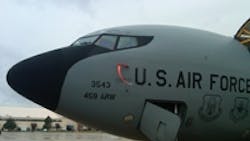This past August, Boeing announced that it planned to relocate its B-1 program and C-130 avionics modernization program from Long Beach, Calif., to Oklahoma City.
The move will add 550 jobs to Boeing's existing operations in Oklahoma City, where the company provides engineering, contractor-logistics services and field support for its military customers.
However, the influx of jobs isn't the only reason that Secretary of Commerce Dave Lopez considers the relocation a huge win for Oklahoma.
The Boeing expansion adds to what Lopez calls "a critical mass of [aerospace] assets as well as contacts" in Oklahoma, which now attributes 10% of its total employment to the aerospace sector.
"I think the growth engine that Oklahoma can ride in the years ahead is going to be aerospace," Lopez says.
Noting that the Defense Department has ramped up pressure on contractors to bring costs down, Boeing Oklahoma City Site Leader Mike Emmelhainz says the state's low cost of living was among the factors that made Oklahoma "a more cost-competitive environment" than Long Beach and other locations competing for the expansion project.
In CNBC's "America's Top States for Business 2011," Oklahoma ranked No. 3 among all states in terms of cost of living and No. 6 in cost of doing business.
"It demonstrates that Oklahoma performs very well in an era where everybody is seeing revenues level off, if not decrease," Lopez says.
Close to the Customer
Cost competitiveness wasn't the only thing that Oklahoma had going in its favor. Boeing's history in the Sooner State dates back to 1953, when the company opened an office, staffed with 10 people, next to Tinker Air Force Base in Oklahoma City.
Today, Boeing has around 700 employees at its Oklahoma City office and at Tinker Air Force Base, and more than 900 in the state overall. Emmelhainz says the past performance of Boeing's workforce in Oklahoma played a role in its decision.
Tinker Air Force Base, which houses the Defense Department's largest aircraft maintenance depot, is one of a number of key assets factoring into the "critical mass" that Lopez hopes can be a magnet for aerospace firms. Others include:
- The Federal Aviation Administration's Mike Monroney Aeronautical Center in Oklahoma City, which trains more than 20,000 aviation students a year.
- American Airlines' Maintenance and Engineering Center in Tulsa, which the airline says is the largest commercial-aircraft maintenance, repair and overhaul facility in the world.
- An aerospace industry that employs 150,000 people with a payroll of $5 billion, according to the state. The more than 500 aerospace-related companies in Oklahoma include BizJet, Boeing, FlightSafety International, Honeywell, Nordam, Northrop Grumman and Spirit Aerosystems.
"In the environment of today's contracting world, those who are worried about winning contracts know what a 2% incentive can do," says Al Goodbary, executive director of the PrimeWin Program Office.
Among other incentives, aerospace firms that hire engineers can receive a tax credit equal to 5% of the engineers' compensation during the first five years of employment, and a 10% tax credit if the engineers graduated from Oklahoma colleges or universities.
The program includes an incentive that offers quarterly cash payments of up to 10% of new payroll to companies that create jobs with wages that are three times higher than the state or county averages.
"When we can offer an incentive like PrimeWin and 21st Century Quality Jobs, and a quality workforce in this state that's going to attract 550 new jobs from Boeing, then we know we're doing a good thing," Schmidt says.
Note: This is the first in a series of two articles on economic development in Oklahoma.
About the Author
Josh Cable
Former Senior Editor
Former Senior Editor Josh Cable covered innovation issues -- including trends and best practices in R&D, process improvement and product development. He also reported on the best practices of the most successful companies and executives in the world of transportation manufacturing, which encompasses the aerospace, automotive, rail and shipbuilding sectors.
Josh also led the IndustryWeek Manufacturing Hall of Fame, IW’s annual tribute to the most influential executives and thought leaders in U.S. manufacturing history.
Before joining IndustryWeek, Josh was the editor-in-chief of Penton Media’s Government Product News and Government Procurement. He also was an award-winning beat reporter for several small newspapers in Northeast Ohio.
Josh received his BFA in creative writing from Bowling Green University, and continued his professional development through course-work at Ohio University and Cuyahoga Community College.
A lifelong resident of the Buckeye State, Josh currently lives in the Tremont neighborhood of Cleveland. When the weather cooperates, you’ll find him riding his bike to work, exercising his green thumb in the backyard or playing ultimate Frisbee.
